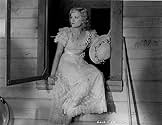Ajouter une intrigue dans votre langueSign painters Joe and Lucky travel around New England looking for jobs. After Joe uses Madge as a model, she hides in their wagon. The painters are about to be charged with kidnapping until ... Tout lireSign painters Joe and Lucky travel around New England looking for jobs. After Joe uses Madge as a model, she hides in their wagon. The painters are about to be charged with kidnapping until she promises to marry Joe. In New York he attempts to paint a huge sign that has stopped o... Tout lireSign painters Joe and Lucky travel around New England looking for jobs. After Joe uses Madge as a model, she hides in their wagon. The painters are about to be charged with kidnapping until she promises to marry Joe. In New York he attempts to paint a huge sign that has stopped others before him.
Photos
- Cop
- (uncredited)
- Sheriff Rock
- (uncredited)
- Hotel Guest with Dog
- (uncredited)
- Minister
- (uncredited)
- Clerk, Circleville General Store
- (uncredited)
- Child
- (uncredited)
- Minor Role
- (uncredited)
- Service Station Attendant
- (uncredited)
Histoire
Le saviez-vous
- AnecdotesBarbara Greenhoot's debut.
Tracy & Erwin play a pair of traveling sign painters who roam the country in a beat-up truck, applying their artistic skill to advertising Beauty Magic cosmetics on billboards or any other convenient space. When we first meet them the guys are driving through a rural area, searching for a barn that will provide a canvas large enough to serve their purposes. They wind up at the farm of a mean old miser named Brown. He's raising a pretty young girl named Madge as his "ward" and intends to marry her to his awful son. Tracy plays a brash, self-confident young buck named Joe Buck—a chuckle for latter-day fans of Midnight Cowboy!—who, in addition to painting billboards, is given to spouting high-flown orations about self-betterment and achievement. (Fortunately, Tracy delivers these speeches with just the right mixture of earnestness and comic pomposity.) Madge is deeply impressed, and after the inevitable confrontation with the Brown family she runs away with Joe and his partner Lucky. The film's highlight comes when she and her rescuers visit a small-town carnival. For today's viewers this sequence is a fascinating evocation of an era long gone, beautifully filmed by distinguished cinematographer Lee Garmes and richly atmospheric. The sequence leads to another highlight, when Joe finally lets down his guard and pours out his feelings for Madge. This scene is beautifully played, and displays Spencer Tracy's skill with romantic comedy, his seemingly effortless ability to be both poignant and funny without ever breaking character or seeming to strain for a laugh.
The plot of Face in the Sky takes some surprising twists in the second half. The Browns track down Madge, and, with the help of local law enforcement, bring her back to the farm for a forced wedding. Joe and his partner Lucky go home in defeat to their company's Manhattan headquarters—located in the Empire State Building, no less—and Joe becomes half-heartedly involved with a wealthy Park Avenue playgirl (played by the gorgeous Lila Lee). Eventually Madge makes her way to the city, where the filmmakers indulge in the movie's most memorable, surreal flourish: when the exhausted girl gazes at a series of urban billboards they come to life and speak to her! Madge is brought back to reality when she sees a billboard Joe has painted at the top of a skyscraper to advertise Beauty Magic. It's her own face in the sky, and it leads her to Joe.
I've looked up some of the reviews this movie received when it was first released in January 1933, at the nadir of the Depression, and it appears that the critics of the day weren't very fond of Face in the Sky. Most called it hokey and excessively coy, and one reviewer compared it to an old Mary Pickford one-reeler of the silent days, a put-down implying it was dated and tired. I can understand that this movie might not be to everyone's taste, but my feeling is that time has been kind to it. What looked dated or hokey to the critics of 1933 looks like period charm today, and the Hollywood production sheen they took for granted looks better than ever to our eyes. Plus, even for those who find the whimsy a bit much, the deft performances of Spencer Tracy and Marian Nixon still connect. While it's no masterpiece, Face in the Sky is one of those quirky products of the studio system that's unexpected, entertaining and ripe for re-evaluation.
- wmorrow59
- 2 févr. 2009
- Lien permanent
Meilleurs choix
Détails
- Durée1 heure 17 minutes
- Couleur
- Rapport de forme
- 1.37 : 1
Contribuer à cette page





















